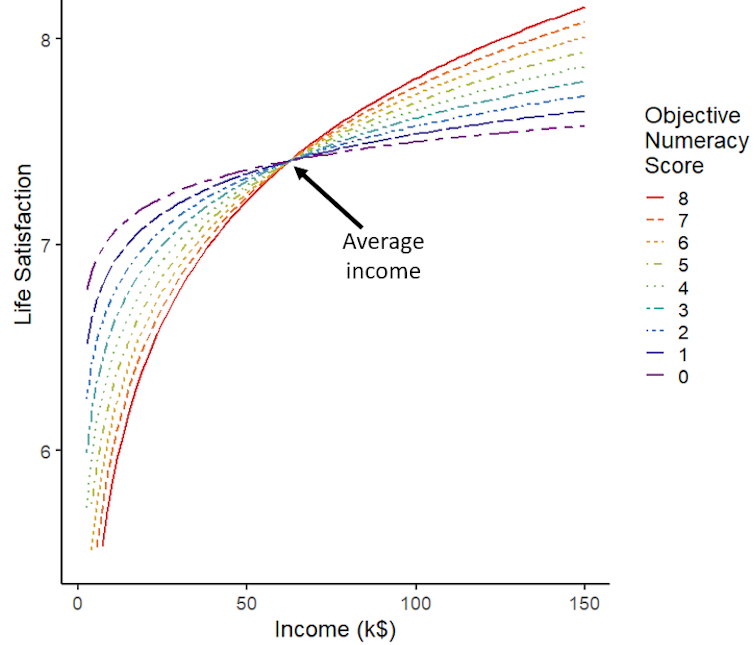Will I Make Enough Money As A Mathematician?
Your class school math teacher probably told you that existence adept at math would be very important to your grownup self. But maybe the younger you didn't believe that at the time. A lot of inquiry, though, has shown that your instructor was right.
We are ii researchers who study controlling and how it relates to wealth and happiness. In a study published in Nov 2021, we establish that, in full general, people who are better at math make more money and are more satisfied with their lives than people who aren't as mathematically talented. Simply being good at math seems to be a double-edged sword. Although math-proficient people are very satisfied when they have high incomes, they are more dissatisfied, compared to those who aren't as skillful at math, when they don't make a lot of money.
Many researchers have suggested that more coin only increases life satisfaction and happiness upwards to a certain point. Our research modifies this idea past showing that satisfaction derived from income relates strongly to how good a person is at math.

A math and happiness examination
We investigated the relationship between math power, income and life satisfaction, using surveys sent to 5,748 diverse Americans equally part of the Understanding America Written report.
The study included two questions and one test relevant to our enquiry. One question asked participants about their household yearly income. Another one asked respondents to rate how satisfied they are with their lives on a scale of zero to 10.
Finally, people answered eight math questions that varied in difficulty to become a sense of their math skills. For example, ane of the moderately difficult questions was: "Jerry received both the 15th highest and the 15th lowest mark in the grade. How many students are in the class?" The correct answer is 29 students.
We then combined the results to run across how they all related to one another.
Math skills and income also are tied to level of pedagogy, so, in our analyses, nosotros controlled for teaching, verbal intelligence, personality traits and other demographics.
Connecting math skills to income and satisfaction
On average, the better a person was at math, the more money they made. For every one additional correct reply on the eight-question math test, people reported an average of $iv,062 more in annual income.
Imagine you have 2 people with the same level of education, one of whom answered none of the math questions correctly and the other answered all of them correctly. Our inquiry predicts that the person who answered all of the questions correctly will earn about $30,000 more than each yr.
The survey as well showed that people who are ameliorate at math were, on average, as well more satisfied with their lives than those with lower math ability. This finding agrees with a lot of other research and suggests that income influences life satisfaction.
Just prior research has shown that the human relationship betwixt income and satisfaction is non as straightforward every bit "more money equals greater happiness." It turns out that how satisfied a person is with their income ofttimes depends on how they feel information technology compares to other people's incomes.
Other research has also shown that people who are meliorate at math tend to make more numerical comparisons in general than those who are worse at math. This led our team to suspect that math-adept people would compare incomes more, too. Our results seem to prove but that.

Simply put, the better a person was at math, the more they cared most how much money they make. People who are better at math had the highest life satisfaction when they had high incomes. But deriving satisfaction from income goes both ways. These people also had the lowest life satisfaction when they had lower incomes. Amongst people who aren't as good at math, income didn't relate to satisfaction nearly equally much. Thus, the same income was valued differently depending on a person'southward math skills.
Money does purchase happiness for some
An often-quoted fact – backed up by research – says that once a person makes around $95,000 a year, earning more money doesn't dramatically increase satisfaction. This concept is called income satiation. Our research challenges that blanket statement.
[Over 140,000 readers rely on The Conversation's newsletters to understand the globe. Sign upward today.]
Interestingly, the people who are best at math did not seem to show income satiation. They were more and more satisfied with more income, and in that location didn't appear to be an upper limit. This did not hold truthful for people who weren't as talented at math. The least math-proficient group gained more satisfaction from income only until virtually $50,000. Afterward that, earning more money fabricated niggling deviation.
For some, money does seem to buy happiness. While more work needs to exist done to really sympathise why, we think information technology may exist because math-oriented people compare numbers – including incomes – to make sense of the world. And mayhap that's not ever a peachy matter. In comparison, those who are worse at math appear to derive life satisfaction from sources other than income. So if you are feeling dissatisfied with your income, peradventure seeing across the numbers will be a winning strategy for you.
Source: https://theconversation.com/the-better-you-are-at-math-the-more-money-seems-to-influence-your-satisfaction-173720
Posted by: hillsidia1949.blogspot.com

0 Response to "Will I Make Enough Money As A Mathematician?"
Post a Comment